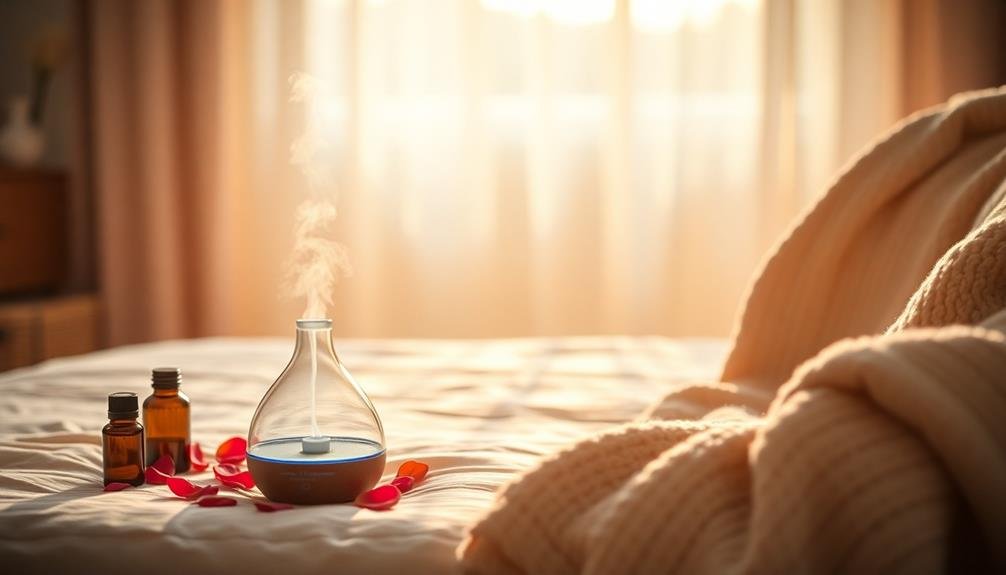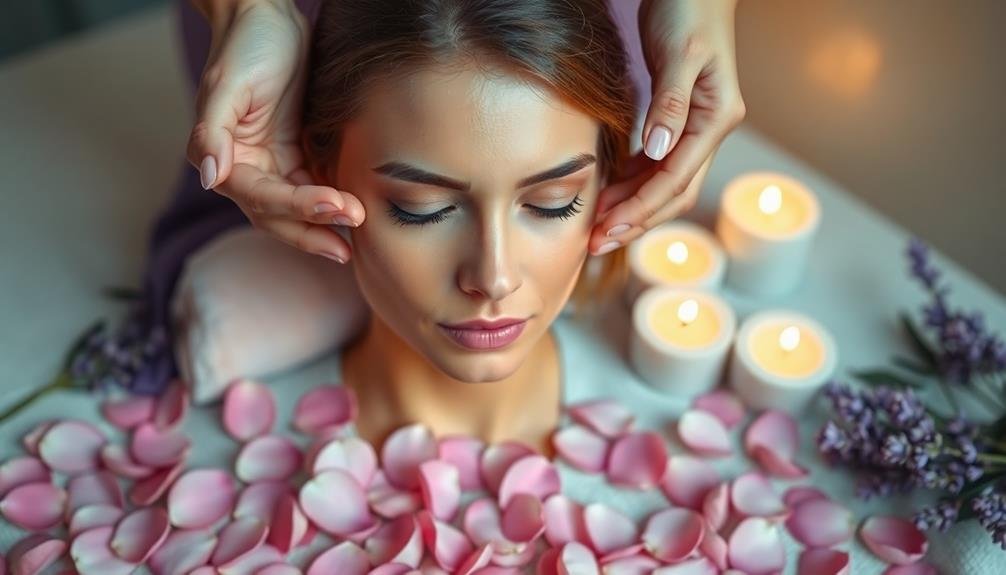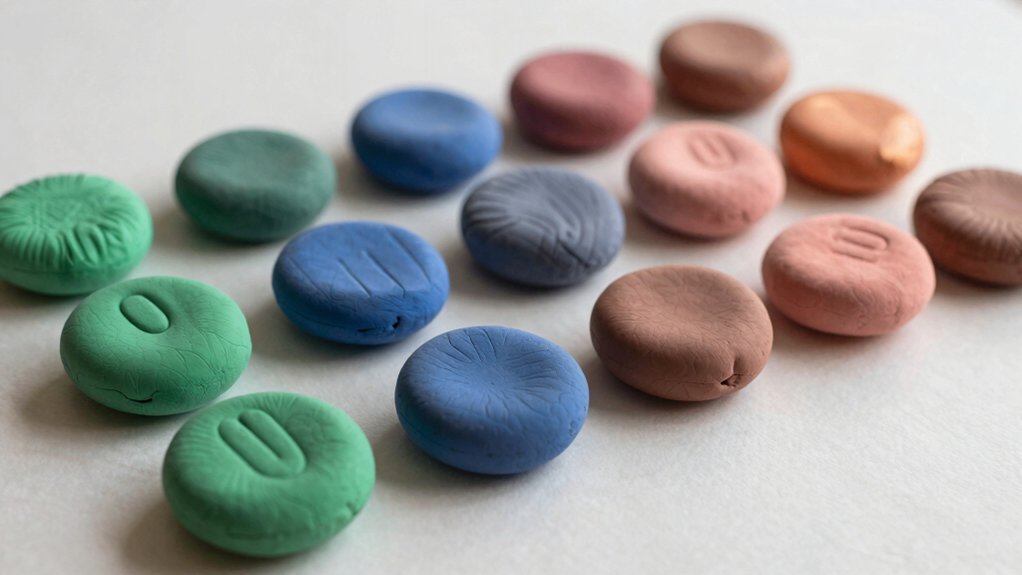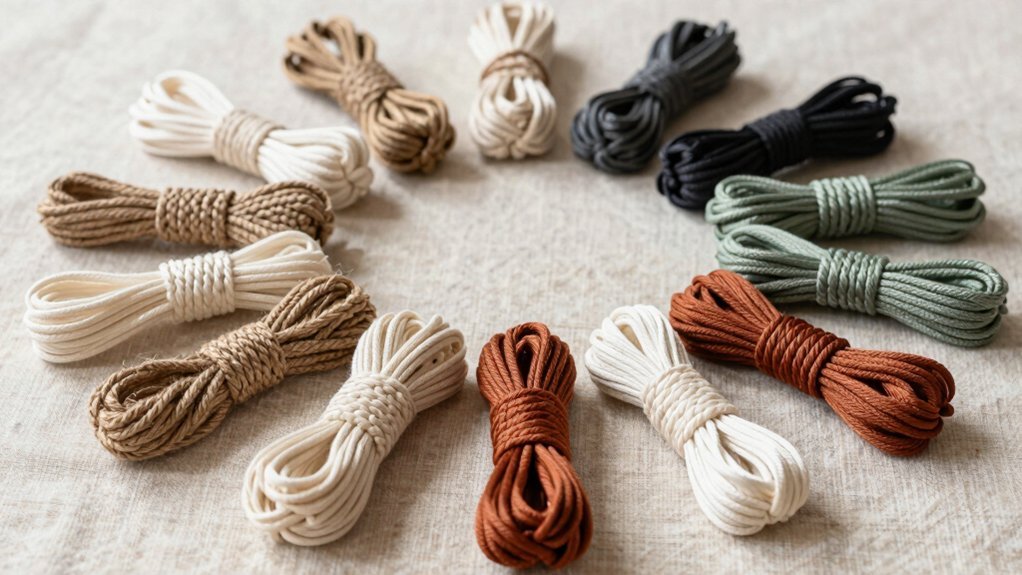Rose oil offers three powerful remedies for anxiety relief that you can easily incorporate into your daily routine. First, try diffuser blends combining rose oil with other soothing scents like lavender or bergamot to promote relaxation. Second, indulge in a calming rose oil bath by mixing a few drops with Epsom salts for a luxurious soak. Third, use rose oil for massage techniques, diluting it with a carrier oil and applying gentle pressure to tension areas. These methods can help reduce stress, ease anxiety symptoms, and promote overall well-being. Discover how these simple practices can transform your anxiety management approach.
Rose Oil Diffuser Blends

Aromatherapy enthusiasts swear by rose oil diffuser blends for anxiety relief. You'll find that combining rose oil with other essential oils can enhance its calming effects and create a more complex, pleasing aroma.
To get started, try mixing 3 drops of rose oil with 2 drops of lavender and 1 drop of bergamot in your diffuser. This blend promotes relaxation and helps ease tension.
For a grounding effect, combine 2 drops of rose oil with 2 drops of frankincense and 1 drop of vetiver. This earthy mixture can help center your thoughts and reduce anxious feelings.
If you're looking for an uplifting blend, mix 2 drops of rose oil with 2 drops of ylang-ylang and 1 drop of orange. This combination can boost your mood and alleviate stress.
When creating your blends, remember that rose oil is potent, so a little goes a long way. Always follow the manufacturer's instructions for your specific diffuser.
Start with small amounts and adjust as needed. Experiment with different combinations to find what works best for you. With regular use, you'll likely notice a reduction in anxiety symptoms and an overall sense of calm.
Calming Rose Oil Bath
You'll find that a calming rose oil bath is an excellent way to unwind and relieve anxiety. To create this soothing experience, start by filling your bathtub with warm water.
Add 5-10 drops of pure rose essential oil to 1 cup of Epsom salts, then mix thoroughly. Pour this mixture into the bath as the water is running to guarantee even distribution.
For an extra luxurious touch, you can add a handful of dried rose petals to the water. As you soak in the bath, take deep breaths and inhale the calming aroma of rose oil. The combination of warm water and rose oil will help relax your muscles and ease tension.
To enhance the effects, dim the lights and play soft, soothing music. Aim to soak for at least 15-20 minutes to fully experience the benefits.
After your bath, pat your skin dry gently and apply a rose-infused moisturizer to lock in the oil's benefits.
Remember to use this remedy no more than twice a week, as overuse of essential oils can lead to skin sensitivity. Always perform a patch test before trying new oils to guarantee you don't have any adverse reactions.
Rose Oil Massage Techniques

While soaking in a rose oil bath can be relaxing, incorporating rose oil into massage techniques offers another effective way to alleviate anxiety.
You'll want to start by diluting pure rose essential oil with a carrier oil like jojoba or sweet almond. Mix 5-10 drops of rose oil per ounce of carrier oil for a safe, effective blend.
Begin your massage by warming the oil between your palms. Focus on areas where you tend to hold tension, such as your neck, shoulders, and temples. Use gentle, circular motions to work the oil into your skin, breathing deeply to inhale the calming scent.
For added relaxation, try a self-massage technique called acupressure. Apply pressure to specific points on your body, such as the inner wrists or the area between your eyebrows.
You can also ask a partner to give you a rose oil massage. They should use long, smooth strokes along your back and limbs, paying extra attention to any knots or tense areas.
Remember to communicate about pressure and comfort levels throughout the massage. Regular rose oil massages can help reduce stress, improve circulation, and promote overall well-being.
Frequently Asked Questions
Is Rose Oil Safe for Pregnant Women or Children?
You should be cautious with rose oil during pregnancy and for children. It's generally safe, but always consult your doctor first. For kids, dilute it properly and avoid using on infants. Supervise older children's use carefully.
How Long Does the Calming Effect of Rose Oil Typically Last?
You'll typically experience rose oil's calming effects for 2-4 hours. It's worth noting that everyone's response varies. You can extend the benefits by reapplying or using diffusers. Regular use may lead to longer-lasting results.
Can Rose Oil Interact With Anxiety Medications?
Yes, rose oil can potentially interact with anxiety medications. You should always consult your doctor before combining it with any prescription drugs. It's best to be cautious and get professional advice to guarantee your safety and well-being.
What's the Difference Between Rose Essential Oil and Rose Absolute?
You'll find that rose essential oil is steam-distilled from petals, while rose absolute is solvent-extracted. Essential oil's purer but less concentrated. Absolute's more intense and closer to the flower's natural scent. They're both used in aromatherapy and perfumery.
Are There Any Potential Side Effects of Using Rose Oil for Anxiety?
You might experience skin irritation, allergic reactions, or headaches when using rose oil for anxiety. It's best to dilute it and do a patch test first. Always consult a doctor if you're pregnant or have health concerns.
In Summary
You've now discovered three powerful ways to harness rose oil's calming properties. Whether you're diffusing it, soaking in a fragrant bath, or enjoying a soothing massage, you'll find relief from anxiety and stress. Don't hesitate to experiment with these methods to find what works best for you. Remember, self-care is essential, and incorporating rose oil into your routine can be a simple yet effective way to promote relaxation and emotional balance in your daily life.





Leave a Reply